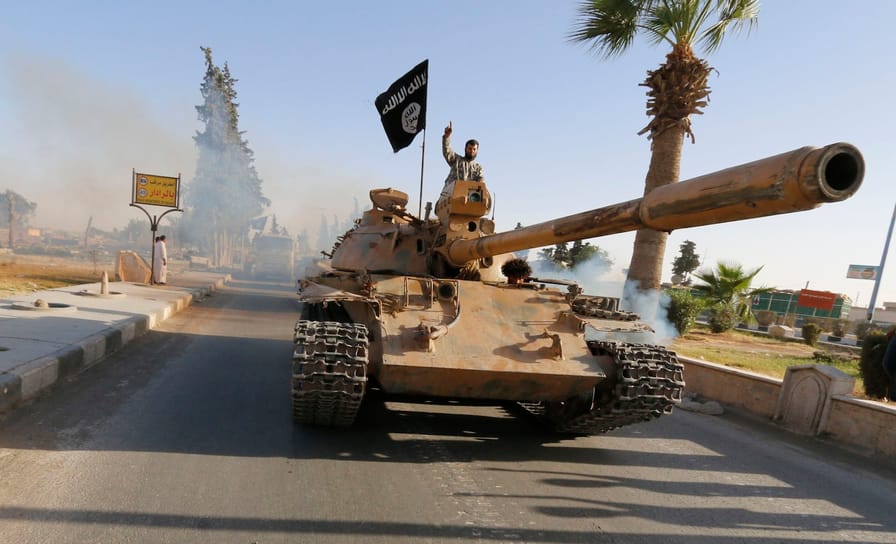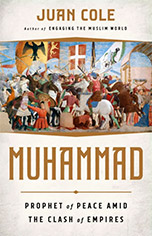How ‘Islamic’ Is the Islamic State?
Those who claim that this destructive cult’s ideology reflects some essential aspect of Islam are obscuring its origins—in George W. Bush’s illegal war that destroyed Iraq and fomented sectarian extremism.
By Juan Cole
FEBRUARY 24, 2015


ISIS fighers in the northern Syria province of Raqqa (Reuters)
=====
Last week a debate erupted over how “Islamic” the so-called “Islamic State” group (ISIS or ISIL) in Syria and Iraq is, and whether it is legitimate to speak of “Islamic” terrorism. It was provoked in part by a Graeme Wood article in The Atlantic and President Obama’s speech to a conference on Combating Violent Extremism. Obama was slammed by former New York City mayor Rudy Giuliani as allegedly not loving America, in part because he declined to speak of “Islamic” terrorism. On Sunday, former deputy defense secretary Paul Wolfowitz, interviewed on CNN’s State of the Union show, called Obama’s refusal to use the phrase “Islamic terrorism” “silly,” saying, “I think people understand that Islam has something to do with what we’re fighting, and when you deny it, you lose a lot of support.” This debate is actually about what philosophers call “essentialism,” and, as Giuliani’s and Wolfowitz’s own interventions make clear, it is about absolving the United States for its own role in producing the violent so-called “Caliphate” of Ibrahim al-Baghdadi.
The question of phraseology is easily dealt with. The word “Islamic” in Arabic, and in English as well, has to do with the ideals of the Muslim religion. It is thus analogous to the word “Judaic.” We speak of “Islamic ethics” as a field of study, just as we do “Judaic ethics.” Not all Muslims or Jews conform to the ethics preached in their religious traditions. Some are even criminals. But then they are Muslim criminals and Jewish criminals. They are not Islamic criminals and Judaic criminals. Likewise in Catholicism, one speaks of Patristic theology, referring to the religious ideas of the Church fathers, but wouldn’t talk of bad priests steeped in that theology as Patristic criminals. It is because both in Arabic and in other languages “Islamic” refers to the ideals of the Muslim religion that both Muslims and people with good English diction object strenuously to a phrase such as “Islamic terrorism” or “Islamic fascism” (fascism was an invention of Christian Europe, in any case).
Those, like Giuliani, who insist on speaking of “Islamic terrorism” want to shape our language so as to imply that the Islamic tradition authorizes the deployment of terrorism, which the US federal code defines as using violence or criminal activities to intimidate civilians or government for political purposes, with the implication that the perpetrators are themselves nonstate actors. But the Islamic legal tradition forbids terrorism defined in that way. Moreover, Muslim academics contend that the Koran, the Muslim scripture, sanctions only defensive war. Giuliani does not know more about the Koran than they do.
Top Articles

The attempt by the American right wing to mainstream the phrase “Islamic terrorism” takes advantage of general American ignorance of the Muslim tradition; it is a linguistic trap intended to make us all Islamophobes. If a politician insisted that we call Israel’s reckless disregard for noncombatant life in last summer’s attack on Gaza “Judaic terrorism” and implied that Israelis acted that way because they are all commanded to do so in the Bible, it would be easy to see this way of speaking as anti-Semitic. President Obama is right to avoid that trap, and he knows enough about Muslims and Islam to recognize it for what it is.
Wolfowitz is arguing that Islam has an “essence” that “has something to do with what we’re fighting.” Essentialism when applied to human groups is always an error and always a form of bigotry. Zionists bombed the King David Hotel in British Mandate Palestine in 1948, killing dozens of civilians and some British intelligence officials. If a British official had responded then by arguing that “everyone knows that Judaism has something to do with what we’re fighting,” it would be fairly clear what that official thought about Jews in general. As for Iraq and Islam, there was no Al Qaeda or ISIL in Iraq in 2002, when Wolfowitz conspired to fight an illegal war on Iraq that killed hundreds of thousands, maimed millions, created millions of widows and orphans, and displaced at least 4 million of Iraq’s then 25 million people, making them homeless. As late as 2012, in a poll conducted by my colleague Mark Tessler at the University of Michigan and several collaborators, 75 percent of Sunni Iraqis said that religion and state should be separate (personal communication). The social maelstrom visited on Iraqis by Wolfowitz’s sociopathy produced radical movements like Al Qaeda in Mesopotamia and ISIL, to which even secular Sunni Iraqis have turned out of desperation. Wolfowitz had no business in Iraq. His actions were illegal. Now this war criminal is blaming “Islam” for “what we’re fighting.”
As for the character of ISIL, the answer to the question being pitched in Washington lies in the field of the sociology of religion. Religious traditions always encompass lots of different kinds of organization.
Then there is the sect. Many (not all) Pentecostals, or a group such as the Jehovah’s Witnesses, would be less institutionalized and more spontaneous, and draw adherents more from the working and lower middle classes, and so would fall into the category of “sect,” as sociologists use the term.
“Sects” are on a spectrum. Some approach churches in becoming more mainstream; arguably Methodists went from being a sect in the nineteenth century to being a mainstream “church” in today’s America. This process involved upward mobility of adherents; church and sect are in part about social class. The lack of institutionalization in sects helps explain why so many televangelists (who typically operate outside the framework of an institutionalized church) are scandal-prone, since they have little in the way of credentialing or oversight.
Some sects form around charismatic individuals or groups of individuals who demand absolute obedience and a high investment of time and monetary resources from adherents. The leadership of this kind of high-tension sect may try to cut followers off from their family and friends. Often, followers are encouraged to believe that the world will end soon, a belief that makes them less likely to resist appeals to hand over large amounts of wealth and control over their lives to the sect leader. Typically, members who criticize the cult leader are not just excommunicated but shunned, with other sect members completely cutting them off socially, even if they are family.
Sects that merely deviate from conventional societal norms are inoffensive. In the Muslim world, the more sect-like Salafis are often politically quietist and generally harmless. But if a sectarian group begins breaking the law or perpetrating violence (kidnapping, torture, child and spousal abuse, and murder), many observers refer to it as a “destructive cult.” Some sociologists object that “cult” has taken on a pejorative connotation, so they prefer a euphemism like “new religious movement.” But academic criminologists speak of harmful criminal organizations all the time, so why should destructive cults not be so labeled? Where Salafis engage in vigilante violence (some call these “Salafi jihadis” but I prefer “vigilantes”), they become destructive cultists.
It is ironic that Americans, of all people, should have difficulty identifying sects and destructive cults, since our history has been littered with them. Nor have they necessarily been small or inconsequential. It is now typically forgotten that in the early twentieth century the Ku Klux Klan was a Protestant religious organization or that it came to power in the state of Indiana in the 1920s and comprised 30 percent of native-born white men there. It was a large social movement, with elements of the destructive cult, in the heart of North America. More recent groups such as Jim Jones’s People’s Temple and David Koresh’s Branch Davidians may have begun as high-tension sects, but at a certain point they became destructive cults.
The refusal to see ISIL in these terms is just a form of Orientalism, a way of othering the Middle East and marking its culture as inherently threatening. The American obsession with this small militia of some 20,000 fighters, which has managed temporarily to seduce or kidnap what I estimate to be 3–4 million people in Syria and Iraq, colors their perception of the whole Middle East. But the big story in the region in the past year is probably the turn of Egypt (population 83 million) toward secular nationalism, such that those dressed as religious Muslims are often being harassed and discriminated against.
That ISIL falls into the category of the destructive cult explains why the formal establishments (“churches”) of the Muslim world reject it. Scholars at Al-Azhar Seminary, the foremost institution of clerical authority in the Sunni Muslim world, and other Muslim establishments condemn it roundly, just as the Episcopal Church rather frowned on the actions of the Branch Davidians. Mainstream Muslims are outraged at allegations that the gratuitous brutality and grandstanding bloodthirstiness of ISIL can be traced to their “church.”
Wood controversially asserted in his article for The Atlantic, “The reality is that the Islamic State is Islamic. Very Islamic.” This assertion is theological, not sociological. No social scientist would say, “The reality is that the Ku Klux Klan is Christian. Very Christian.” If what Wood meant to say was that ISIL is a Muslim cult rather than a Buddhist one, that assertion is uncontroversial. If he means that Islam has an essence, of which ISIL partakes or indeed that ISIL is a natural outcome of the alleged Islamic essence, then he is speaking as a medieval Platonist, not as a contemporary social scientist.
Nationalism is probably also a conceptual veil here. Since the nineteenth century, religious movements have typically been inflected with nationalism, but in Europe and North America the national marker of identity has tended to be foregrounded, even where religion formed a key part of a movement. Thus, the Croatian Ustashe during World War II is typically seen as a form of nationalism, whereas Catholic identity and institutions were deeply implicated in it, and the fascist Ustashe demanded that Serbs convert to Catholicism. In its viciousness, destructiveness and ambition, the Ustashe was not very different from ISIL today. ISIL is put under the sign of religion, but it is in fact a form of nationalism appealing to medieval religious symbols. Nor is its ruthlessness unprecedented in modern history. It is not clear that Muslim ISIL adherents have as yet managed to kill a fraction of the number of people (over 500,000) that the Ustashe polished off in death camps in the 1940s.
Why is ISIL so much more powerful and widespread than the Branch Davidians? It is not in the main because their ideas are more attractive to people in Syria and Iraq than Branch Davidian ideas were in Texas, though the success of cults in appealing to people on the basis of religious symbols cannot be denied.
----
First, ISIL operates in areas where the state has collapsed. In the case of Iraq, that collapse was induced by the George W. Bush regime, including Paul Wolfowitz. In the case of Syria, the collapse is of course the result of the Assad regime’s repression of the protest movement in 2011, and the ensuing the civil war. It is also probably owing in part to long-term severe drought and disastrous neoliberal policies, as well as the international trade boycott organized by the US Congress in 2003, the Syria Accountability Act, at the behest of the Israel lobbies. Strong states in the region would simply have suppressed this movement, as the Clinton administration suppressed the Branch Davidians in the United States.
Second, it is because ISIL has gained enormous coercive power. The group gained battle experience fighting against US troops in Iraq and then against the Syrian Arab Army. Its fighters captured medium and some heavy weapons from the SAA and the Iraqi Army (the latter fled Mosul last June, leaving tanks and artillery behind). Most of the people who temporarily live under ISIL rule don’t have a choice in the matter, but rather face a 20,000-strong, battle-hardened and well-armed militia. It is also well-heeled, with revenues from petroleum, oil and human smuggling and from hard-line Salafi millionaires in the Persian Gulf oil states.
Third, sectarian conflict accounts for some of the support ISIL receives. The cosmopolitan and largely secular-minded Sunni Iraqis of Mosul, a city the size of Houston, would have had nothing but contempt for this ragtag band of scruffy fundamentalists and sadistic opportunists before Bush invaded their country, consigned them to unemployment and social demotion, and put pro-Iran Shiite fundamentalists in power over them. It is not generally mere poverty that creates destructive social movements but economic uncertainty and humiliation visited on well-educated, formerly middle-class people. Who visited these things on the Sunni Arabs of Iraq? The Bush regime and its officers and supporters, people like Paul Wolfowitz and Rudy Giuliani, who now want to engage in essentialism and blame Islam for the disaster. All criminals have a cover story, and what they’re really doing is castigating President Obama for not corroborating their alibi.
People who actually love the United States want to rescue it from foreign adventurism and improve the health and welfare of its people. They would want to discourage bigotry and black-and-white thinking, which makes war so much more thinkable. And they would eschew wars of aggression, a daisy chain that brings more wars in its wake.
Juan ColeTWITTER





